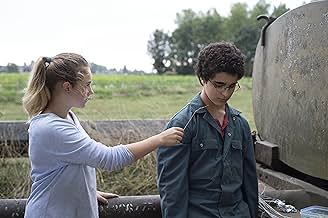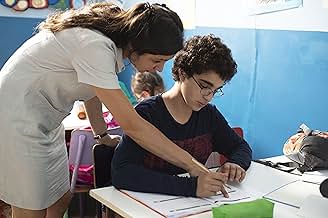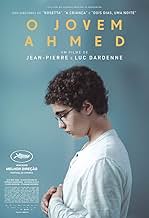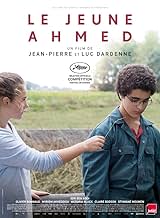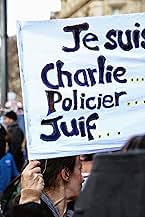VALUTAZIONE IMDb
6,6/10
4927
LA TUA VALUTAZIONE
Un adolescente belga organizza un complotto per uccidere il suo insegnante dopo aver addottato un'interpretazione estremista del Corano.Un adolescente belga organizza un complotto per uccidere il suo insegnante dopo aver addottato un'interpretazione estremista del Corano.Un adolescente belga organizza un complotto per uccidere il suo insegnante dopo aver addottato un'interpretazione estremista del Corano.
- Regia
- Sceneggiatura
- Star
- Premi
- 5 vittorie e 12 candidature totali
Eva Zingaro
- Psychologue du centre
- (as Eva Zingaro-Meyer)
Recensioni in evidenza
Le Jeune Ahmed is not just another movie about radicalism, misogyny, or going down the wrong path. As in life, the reality is far more complex and the Dardenne brothers understand that deeply. They are masters at portraying subtle, everyday life; not overly dramatic, but rich in nuance and emotional truth.
It's no different here. The film begins with the deeply unsettling unraveling of a boy who believes he must hate his teacher. Brainwashed by his imam, he follows a path of destruction. Yet when he's caught and placed under the care of the state, a shift begins. Removed from his known environment, he's sent to work on a farm, where he meets a girl his own age. What begins as a typical "girl-meets-boy" situation takes an unexpected turn: unlike the usual teenage story, Ahmed is torn between the hate he was conditioned into, and the unfamiliar feelings of mutual attraction and connection.
Le Jeune Ahmed is far too subtle and socially engaged to become a simplistic tale of good versus evil. Life isn't simple and this film doesn't pretend it is. This is no Hollywood redemption arc. The Dardenne brothers deliver a beautifully restrained yet emotionally charged drama that lingers long after it ends.
It's no different here. The film begins with the deeply unsettling unraveling of a boy who believes he must hate his teacher. Brainwashed by his imam, he follows a path of destruction. Yet when he's caught and placed under the care of the state, a shift begins. Removed from his known environment, he's sent to work on a farm, where he meets a girl his own age. What begins as a typical "girl-meets-boy" situation takes an unexpected turn: unlike the usual teenage story, Ahmed is torn between the hate he was conditioned into, and the unfamiliar feelings of mutual attraction and connection.
Le Jeune Ahmed is far too subtle and socially engaged to become a simplistic tale of good versus evil. Life isn't simple and this film doesn't pretend it is. This is no Hollywood redemption arc. The Dardenne brothers deliver a beautifully restrained yet emotionally charged drama that lingers long after it ends.
Summary
In the current context of the resurgence of neo-fascism and with a World Cup about to be held in a misogynistic and homophobic Islamic theocracy, it is opportune to see the 2018 film in which the Dardenne brothers bravely tackled Muslim youth fundamentalism, establishing a successful cross between the psychology of the solitary leading character, the context in which he moves and certain precepts of Islam, without this being relativized or blurred.
The women act as disturbers, opponents and challengers of Islam's religious and macho misogyny embodied in the impenetrable, resolute, fanatical and tenacious teenager Ahmed, a young out-of-place radical for whom violence ends up being as natural as it is inevitable.
Review
The film follows Ahmed, a Muslim teenager from a Belgian village, who does not hesitate to resort to violence based on his interpretation of the imam's teachings on him and the Koran.
This time the Dardenne brothers face a thorny issue, and they do it frankly and without fear. I say without fear because they do not fear that by addressing the issue of Islamic fundamentalism they will be branded as Islamophobes.
The film rightly establishes a cross between the psychology of the character, the context in which he moves and certain precepts of Islam, but without this being relativized or blurred by the former. They are three dimensions that enhance each other.
There is an inevitable clash (and some irony) between the secularism of the Belgian public school and the objections of some Muslim parents who oppose for religious reasons the proposals of Ahmed's teacher of Arab origin.
An important aspect that went unnoticed by the critics is the centrality in the history of women as threats, opponents and challengers of Islam's religious and sexist misogyny, as representatives of evil that must be avoided, combated and even eliminated. It is the female figures (the mother, the sister, his teacher Inés and another that I will not reveal) who assume the destabilizing role of an Ahmed who combines his fear of female contact with a religious precept that demonizes him, while the Imam Youssuf assumes the role of the absent father, guarantor of the rules, whose teachings the young man combines with those of a religious leader who follows the web.
Another interesting aspect is that The Young Ahmed does not follow the process of religious radicalization of the adolescent, but rather the character is already approached with such a degree of fanaticism that it only remains for him to take him to the field of a violence that is as natural as it is inevitable for him. On the other hand, he is illustrative of how the system faces and seeks to redirect these situations, emphasizing respect and containment.
The Dardenne resort to their usual dry tone, with handheld camera moments that reinforce a realism supported by the presence of actors unknown to the general public. Idir Ben Addi assumes the difficult and at times unpleasant role of an impenetrable, determined, fanatical and tenacious adolescent, with an opacity that sustains an unpredictability that adds elements of a thriller to the psychological and social drama, in a story that is even more disturbing to present to us. To an unincorporated fundamentalist who acts completely on his own.
In the current context of the resurgence of neo-fascism and with a World Cup about to be held in a misogynistic and homophobic Islamic theocracy, it is opportune to see the 2018 film in which the Dardenne brothers bravely tackled Muslim youth fundamentalism, establishing a successful cross between the psychology of the solitary leading character, the context in which he moves and certain precepts of Islam, without this being relativized or blurred.
The women act as disturbers, opponents and challengers of Islam's religious and macho misogyny embodied in the impenetrable, resolute, fanatical and tenacious teenager Ahmed, a young out-of-place radical for whom violence ends up being as natural as it is inevitable.
Review
The film follows Ahmed, a Muslim teenager from a Belgian village, who does not hesitate to resort to violence based on his interpretation of the imam's teachings on him and the Koran.
This time the Dardenne brothers face a thorny issue, and they do it frankly and without fear. I say without fear because they do not fear that by addressing the issue of Islamic fundamentalism they will be branded as Islamophobes.
The film rightly establishes a cross between the psychology of the character, the context in which he moves and certain precepts of Islam, but without this being relativized or blurred by the former. They are three dimensions that enhance each other.
There is an inevitable clash (and some irony) between the secularism of the Belgian public school and the objections of some Muslim parents who oppose for religious reasons the proposals of Ahmed's teacher of Arab origin.
An important aspect that went unnoticed by the critics is the centrality in the history of women as threats, opponents and challengers of Islam's religious and sexist misogyny, as representatives of evil that must be avoided, combated and even eliminated. It is the female figures (the mother, the sister, his teacher Inés and another that I will not reveal) who assume the destabilizing role of an Ahmed who combines his fear of female contact with a religious precept that demonizes him, while the Imam Youssuf assumes the role of the absent father, guarantor of the rules, whose teachings the young man combines with those of a religious leader who follows the web.
Another interesting aspect is that The Young Ahmed does not follow the process of religious radicalization of the adolescent, but rather the character is already approached with such a degree of fanaticism that it only remains for him to take him to the field of a violence that is as natural as it is inevitable for him. On the other hand, he is illustrative of how the system faces and seeks to redirect these situations, emphasizing respect and containment.
The Dardenne resort to their usual dry tone, with handheld camera moments that reinforce a realism supported by the presence of actors unknown to the general public. Idir Ben Addi assumes the difficult and at times unpleasant role of an impenetrable, determined, fanatical and tenacious adolescent, with an opacity that sustains an unpredictability that adds elements of a thriller to the psychological and social drama, in a story that is even more disturbing to present to us. To an unincorporated fundamentalist who acts completely on his own.
YOUNG AHMED
The justifiably renowned Dardenne Brothers won the Cannes Directing prize for YOUNG AHMED, but, it isn't one of their stronger films, despite some interesting thematic elements. Ahmed (Idir Ben Addi) is a teenage Muslim in Belgium who, under the influence of a radical Imam (Othmane Moumen ) becomes increasingly strict in his religious practices putting him at odds with the more open ways of his school and even his own family (neither his mother (Claire Bodson) or sister wear hijabs). When Ahmed puts his radical thoughts into action he is placed in a youth detention/rehabilitation center. It is there that the bulk of the brief 84 minute picture is set, and where Ahmed continues to struggle finding his way between his ultra-conservative and strict principles, and adapting to the modern world. Much of the criticism of the Dardennes has been that it doesn't provide enough answers about Ahmed. Throughout their distinguished careers, the brothers have never been ones to provide easy conclusions, they are most adept at posing questions and challenging the viewer. What keeps YOUNG AHMED from fully succeeding is that in their best work (ROSETTA, L'ENFANT) the directing team finds a way to provide a strong dramatic narrative to pose their queries. Here, Ahmed's tale, while well documented, fails to fully engage. The movie has moments, but, they are fleetingly effective.
The justifiably renowned Dardenne Brothers won the Cannes Directing prize for YOUNG AHMED, but, it isn't one of their stronger films, despite some interesting thematic elements. Ahmed (Idir Ben Addi) is a teenage Muslim in Belgium who, under the influence of a radical Imam (Othmane Moumen ) becomes increasingly strict in his religious practices putting him at odds with the more open ways of his school and even his own family (neither his mother (Claire Bodson) or sister wear hijabs). When Ahmed puts his radical thoughts into action he is placed in a youth detention/rehabilitation center. It is there that the bulk of the brief 84 minute picture is set, and where Ahmed continues to struggle finding his way between his ultra-conservative and strict principles, and adapting to the modern world. Much of the criticism of the Dardennes has been that it doesn't provide enough answers about Ahmed. Throughout their distinguished careers, the brothers have never been ones to provide easy conclusions, they are most adept at posing questions and challenging the viewer. What keeps YOUNG AHMED from fully succeeding is that in their best work (ROSETTA, L'ENFANT) the directing team finds a way to provide a strong dramatic narrative to pose their queries. Here, Ahmed's tale, while well documented, fails to fully engage. The movie has moments, but, they are fleetingly effective.
The Dardenne brothers have once again produced a film that is both simple and powerful.
As the title suggests, this is the story of young Ahmed, a pre-teen who becomes totally involved in Islamism under the influence of an imam who recruits people to kill those who don't think like the Islamists. The film is interesting because it shows how the imam goes about indoctrinating him. The film is interesting because it shows how the imam goes about indoctrinating him, which will disturb, interrogate and question those around him: his school teacher, his family.
The great quality of the film is its script and staging: the story is told through the staging and what we see, i.e. Not through dialogues, intertitles or voice-overs, but through the behavior of the characters, particularly the young man. It's an impressive feat of realism and simplicity, giving every second of the film a sense of tension, a seemingly inescapable race to the finish. As the viewer is constantly from the young man's point of view, but not in his head, he discovers and understands what he is doing with a slight delay. And of course, the Dardennes exclude music from the staging: the film contains none. There's no bias to make us understand or dramatize what we're watching. A kind of empirical method.
Simple, powerful cinema. Prix de la Mise en Scène at the 2019 Cannes Film Festival. It seems obvious.
As the title suggests, this is the story of young Ahmed, a pre-teen who becomes totally involved in Islamism under the influence of an imam who recruits people to kill those who don't think like the Islamists. The film is interesting because it shows how the imam goes about indoctrinating him. The film is interesting because it shows how the imam goes about indoctrinating him, which will disturb, interrogate and question those around him: his school teacher, his family.
The great quality of the film is its script and staging: the story is told through the staging and what we see, i.e. Not through dialogues, intertitles or voice-overs, but through the behavior of the characters, particularly the young man. It's an impressive feat of realism and simplicity, giving every second of the film a sense of tension, a seemingly inescapable race to the finish. As the viewer is constantly from the young man's point of view, but not in his head, he discovers and understands what he is doing with a slight delay. And of course, the Dardennes exclude music from the staging: the film contains none. There's no bias to make us understand or dramatize what we're watching. A kind of empirical method.
Simple, powerful cinema. Prix de la Mise en Scène at the 2019 Cannes Film Festival. It seems obvious.
While the main character could have a used a bit more character development, once we know his goal and his different attempts the suspense becomes riveting.
Knowing quite well the events in France and Belgium of the past year I'd say that the film is a strong realistic representation of fanatism in a miniature setting.
Knowing quite well the events in France and Belgium of the past year I'd say that the film is a strong realistic representation of fanatism in a miniature setting.
Lo sapevi?
- QuizThis movie was selected to compete for the Palme d'Or at the 2019 Cannes Film Festival, where it eventually won the Best Director Award, marking the first time the award was officially shared by a directing duo winning for a single film (although Joel Coen has won the award three times for movies he co-directed with his brother Ethan Coen where Ethan had to go uncredited per DGA rules).
- ConnessioniReferences Cars - Motori ruggenti (2006)
- Colonne sonoreDelay
Performed by Intergalactic Lovers
I più visti
Accedi per valutare e creare un elenco di titoli salvati per ottenere consigli personalizzati
- How long is Young Ahmed?Powered by Alexa
Dettagli
- Data di uscita
- Paesi di origine
- Sito ufficiale
- Lingue
- Celebre anche come
- Young Ahmed
- Luoghi delle riprese
- Rue Chapuis 37, Seraing, Liège, Wallonia, Belgio(Graines de Génie tutoring school)
- Aziende produttrici
- Vedi altri crediti dell’azienda su IMDbPro
Botteghino
- Lordo Stati Uniti e Canada
- 21.291 USD
- Fine settimana di apertura Stati Uniti e Canada
- 4216 USD
- 23 feb 2020
- Lordo in tutto il mondo
- 1.522.606 USD
- Tempo di esecuzione1 ora 25 minuti
- Colore
- Proporzioni
- 1.85 : 1
Contribuisci a questa pagina
Suggerisci una modifica o aggiungi i contenuti mancanti

Divario superiore
By what name was L'età giovane (2019) officially released in India in Hindi?
Rispondi
![Guarda Bande-annonce [OV]](https://m.media-amazon.com/images/M/MV5BM2RiNjYyN2MtNTdhOC00MmQxLWIwYmItNzE1YjkyMjkxYTk0XkEyXkFqcGdeQXRyYW5zY29kZS13b3JrZmxvdw@@._V1_QL75_UX500_CR0)

